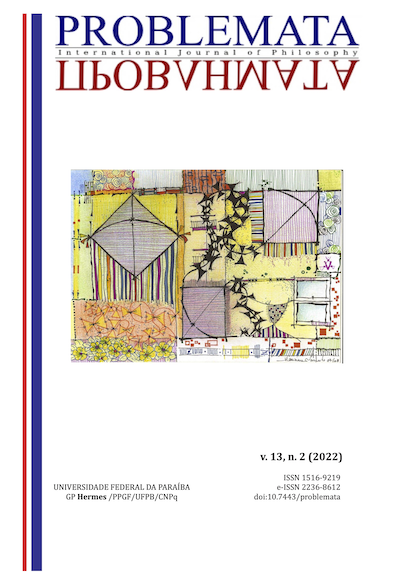HUSSERL, MILLIKAN AND INTENTIONALISM
DOI:
https://doi.org/10.7443/problemata.v13i2.63795Keywords:
Teleology, Intentionality, Husserl, Millikan, Naturalization of phenomenologyAbstract
In this article, I deal with the concept of intentionality. The theoretical proposal is to contrast the approaches of Husserl and Millikan, two authors who make use of this notion, despite presenting different philosophical proposals. In both cases, the concept of intentionality can be linked to their semantic theories, just as intentionality is associated with the notion of teleology. The conflict exposed here brings up questions referring to the classic debate between intensionalism and extensionalism, and, in the broader theoretical panorama, it deals with the reasonably recent attempt to naturalize phenomenology. Despite adopting opposing positions in the epistemic debate about the nature of meaning, we find in their semantic theories normative elements that are both intentional and teleological. Likewise, in both Husserl's phenomenology and Millikan's biosemantics, the conceptual elaboration of intentionality presupposes a theory of representation and the conceptual expansion of some terms used, to ensure the intersubjective character of meaning and signification.
Downloads
References
ABBAGNANO, Nicola. Dicionário de Filosofia. São Paulo: Martins Fontes, 2007.
BRENTANO, Franz, Psychology from an empirical standpoint. Translated by Antos C.Rancurello, D.B.Terrelland Linda L.McAlister. New York: Routledge, 2009.
CHURCHLAND, Paul M. Matéria e consciência: uma introdução contemporânea à filosofia da mente. Trad. Maria Clara Cescato. São Paulo: Editora Unesp, 2004.
DOYON, Maxime. The normative turn of perceptual intentionality and its metaphysical consequences (or why Husserl was neither a disjunctivist nor a conjunctivist). In The Husserlian Mind. Hanne Jacobs (Editor). New York: Routledge Philosophical Minds, 2022.
FUMERTON, Richard. Epistemologia. Edição digital. Trad. Sofia Inês Albornoz Stein e Ramon Felipe Wagner. Petrópolis, RJ: Editora Vozes, 2014.
GODFREY-SMITH, Peter. Mental Representation, Naturalism,and Teleosemantics. In Teleosemantics New Philosophical Essays. Graham Macdonald and David Papineau (Editors) Oxford: Claredon Press, 2006.
HUSSERL, Edmund. A crise das ciências europeias e a fenomenologia transcendental: uma introdução à filosofia fenomenológica. De acordo com a Husserliana VI. Trad. Diogo Falcão Ferrer. 1ª Ed. Rio de Janeiro: Forense Universitária, 2012.
HUSSERL, Edmund. Ideias para uma fenomenologia pura e para uma filosofia fenomenológica: introdução geral à fenomenologia pura. Trad. Márcio Suzuki. Aparecida, SP: Ideias e Letras, 2006.
HUSSERL, Edmund. Investigações lógicas: prolegômenos à lógica pura. Vol. I. Trad. Diogo Ferrer. 1ª Ed. Rio de Janeiro: Forense, 2014.
HUSSERL, Edmund. Investigações lógicas: sexta investigação (elementos de uma elucidação fenomenológica do conhecimento). Coleção Os pensadores. São Paulo: Abril Cultural, 1975.
HUSSERL, Edmund. Meditações cartesianas e Conferências de Paris. De acordo com o texto da Husserliana I. Trad. Pedro M. S. Alves. Rio de Janeiro: Forense Universitária, 2013.
LERCLEC, André. Como ser intencionalista e disposicionalista. In: Prometheus Journal of Philosophy. Dossiê Linguagem e Cognição. Nº 33, 2020, p. 65-78. Disponível em: <https://seer.ufs.br/index.php/prometeus/article/view/13807> Acesso em 24 de Jul. 2022.
MERLEAU-PONTY, Maurice. Fenomenologia da percepção. Trad. Carlos Alberto Ribeiro de Moura. 2ª. Ed. São Paulo: Martins Fontes, 1999.
MERLEAU-PONTY, Maurice. O filósofo e sua sombra. Coleção Os pensadores. São Paulo: Abril Cultural, 1975.
MIGUENS, Sofia. Dennett, Millikan e o telefuncionalismo. Revista Portuguesa de Filosofia, (1998), p. 467-509. Disponível em <https://philpapers.org/rec/MIGDME> Acesso 26 de jun. 2022.
MILLIKAN, Ruth Garret. Biosemantics. In Brian P. McLaughlin & Ansgar Beckerman (eds.), Journal of Philosophy. Oxford University Press. pp. 281--297 (1989). Disponível em < https://philpapers.org/rec/B> Access 20th Jul. 2022.
MILLIKAN, Ruth Garret. Language, a biological model. Oxford University Press, 2005.
MOURA, Carlos Alberto Ribeiro de. Crítica da razão na fenomenologia. São Paulo: Nova Stella: Editora da Universidade de São Paulo, 1989.
OLIVA, Alberto. Filosofia da Ciência. 3ª Ed. Rio de Janeiro: Zahar, 2003.
OLIVEIRA, Manfredo Araújo de. Reviravolta linguístico-pragmática na filosofia contemporânea. 3ª Ed. São Paulo: Edições Loyola, 2006.
RENAUDIE, Pierre-Jean. The First Breakthrough: Psychology, theory of knowledge, and phenomenology of meaning in Logical Investigations. In The Husserlian Mind. Hanne Jacobs (Editor). New York: Routledge Philosophical Minds, 2022.
SACRINI, Marcus. A cientificidade na fenomenologia de Husserl. São Paulo: Edições Loyola, 2018.
SILVA, Porfírio. Intencionalidade: mecanismo e interação. Principia 14(2): (2010), pp. 255–27.
STEIN, Sofia Inês Albornoz. Os propósitos da linguagem: a naturalização da semântica. In: SILVA, Cibelle Celestino; SALVATICO, Luis (Eds.). Filosofia e História da Ciência no Cone Sul: seleção de trabalhos do 7º Encontro da AFHIC. Porto Alegre: Entrementes Editorial, 2012. p. 536-542.
TUGENHAT, Ernest; WOLF, Ursula. Propedêutica lógico-semântica. Trad. Fernando Augusto da Rocha Rodrigues. Petrópolis, RJ: Vozes, 1996.
Downloads
Published
Issue
Section
License
Copyright (c) 2022 Luciane Luisa Lindenmeyer

This work is licensed under a Creative Commons Attribution 4.0 International License.
Authors who publish with this journal agree to the following terms:
- Authors retain copyright and grant the journal right of first publication with the work simultaneously licensed under a Creative Commons Attribution License that allows others to share the work with an acknowledgement of the work's authorship and initial publication in this journal.
- Authors are able to enter into separate, additional contractual arrangements for the non-exclusive distribution of the journal's published version of the work (e.g., post it to an institutional repository or publish it in a book), with an acknowledgement of its initial publication in this journal.
-
- Authors are permitted and encouraged to post their work online (e.g., in institutional repositories or on their website) prior to and during the submission process, as it can lead to productive exchanges, as well as earlier and greater citation of published work (See The Effect of Open Access).





